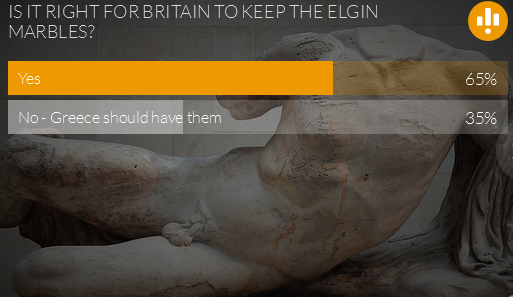
The Telegraph
The surprise announcement came only 48 hours after Amal Clooney and the team at London’s Doughty Street Chambers sent the Greek government a 150-page report admitting that there was only a 15% chance of their success in a British court, and that Greece should consider pursuing the claim at the International Court of Justice. However, quite understandably, the Greek government has decided that what Clooney is really saying is that they have no case.
The Syriza government is keenly aware that British courts are recognized the world over for their experience in resolving international disputes, including those involving British interests and institutions. So, quite reasonably, the new Greek government has concluded that an international court will probably not reach a different conclusion. Nikos Xydakis, culture minister, has therefore announced that Greece will drop its legal claim and pursue “diplomatic and political” avenues instead.
This is unsurprising, as — contrary to the widespread misconception — there was nothing illegal about the way in which Lord Elgin saved the Parthenon Sculptures from acute ongoing destruction. The mauling had started when the Greek church smashed up a large number of the ancient temple’s carvings in the fifth century. The Venetians then blew up chunks of the building in 1687. And in the 1800s, when Lord Elgin arrived in Athens, the occupying Ottomans were grinding the sculptures up for limestone and using them for artillery target practice.
Elgin had intended to commission casts and paintings of the sculptures, but when he saw firsthand the ongoing damage (about 40% of the original sculptures had been pulverised), he acquired an export permit from the Ottoman authorities in Athens, and brought as many as he could back to safety in Britain. It was a personal disaster which bankrupted him, but it has meant that, since 1816, the British Museum has been able to share with its visitors some of the best-preserved Parthenon Sculptures in the world.
What is usually missing in the emotion of the Elgin Marbles debate is that the British Museum is a universal museum, which tells the story of humanity’s cultural achievements from the dawn of time. In this, the work of the Ancient Greek department is world leading, and part of a network of museum classicists — including those from the New Acropolis Museum in Athens — who work together collaboratively, sharing their knowledge and passion for the classical world with the widest possible public.
Coincidentally, the British Museum (the nation’s largest tourist attraction) is currently hosting a once-in-a-lifetime exhibition of Greek sculpture, drawing on its own collection and generous loans from other museums all over the world to showcase the evolution of ancient Greek ideas about beauty and the human body. In this breathtaking visual story of the march of classical ideas about aesthetics, the Parthenon Sculptures take their place, contributing eloquently to the state of sculpture in the golden age of Athenian carving under Pheidias.
The overarching misconception we need to get over is that museum objects belong uniquely to the country in which they were created. If that was so, the world should empty out its leading museums of the foreign artefacts they have purchased or been donated. Athens would be no exception in this, and would be required to return their extensive collections of Egyptian, Chinese, Islamic, and South American art.
Of course, it is an absurd idea. The world is manifestly enhanced by museums and their depth of specialised knowledge. They are, above all, educational places that enrich us all. The fact that half the surviving sculptures from the Parthenon can be seen in Athens, with the remaining half split between London, Berlin, Munich, Würzburg, Copenhagen, the Vatican, and — thanks to the British Museum — the Hermitage in St Petersburg earlier this year, ensures that the widest possible audience is able to experience for themselves the unique and bewitching ability of fifth-century Athenians to convert rough stone into warm, living flesh.
Another page has turned definitively in the story of the Parthenon Sculptures. The idea that Lord Elgin or Parliament did something illegal has finally been dropped, and not before time. Now the debate can proceed in a less antagonistic manner, and everyone can acknowledge that it is a question of politics, not looted artefacts.
As the world has recently discovered from the tragic destruction of Assyrian art at Nimrud, Mosul, and elsewhere in the Middle East, the planet’s heritage does not last unless someone looks after it. And so far, in the case of the Parthenon Sculptures (and indeed its holdings of Assyrian sculpture), the British Museum continues to do the world an enormous service
Author: Dominic Selwood | Source: The Telegraph [May 14, 2015]